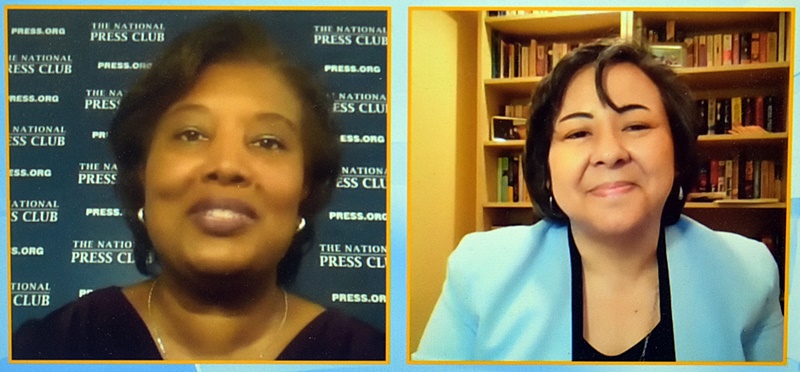Southern Poverty Law Center president says Trump, social media fueled surge in far-right, white nationalist ideology
Far-right extremism and white nationalist sentiment in the United States have reached a boiling point, Margaret Huang, president and CEO of the Southern Poverty Law Center (SPLC) said Friday at a National Press Club Headliners event.
“We’re facing a crisis of far-right extremism and deep threats to our democracy," Huang told National Press Club President Lisa Nicole Matthews. "We all saw this threat on January 6 when the pro-Trump mob led by white nationalists and other far-right extremists rampaged through the Capitol in an attempt to stop Congress from certifying the Electoral College votes.”
Huang also noted an increase in domestic terrorist attacks, racially-charged police incidents, hate crimes targeting Asian-Americans and Pacific Islanders, and racially-biased legislation such as the recent Georgia voter suppression law.

The Department of Homeland Security earlier this year issued a National Terrorism Advisory System Bulletin warning regarding a surge in acts of violence by domestic extremists motivated by racial and ethnic hatred and objection to the 2020 election results.
While participation in white nationalism and other extremist groups has existed in the U.S. for some time, the SPLC is seeing a proliferation of the ideology as a result of Trumpism and social media, Huang said.
The SPLC’s 2020 annual report “The Year in Hate and Extremism” identified 838 active hate groups in the U.S., and thousands of instances of racist conspiracy theories and white nationalist ideology infiltrating mainstream American society.
White nationalist groups grew almost 50% just one year after Trump’s 2015 campaign started, the study found. Over the past four years, hate groups grew by 30% to a new high, fueled by the president himself who is “a prolific promoter of far-right conspiracy theories and racist tropes,” Huang said.
Social media – particularly a dramatic increase in platforms that allow extremist rhetoric – has helped individuals involved with, or interested in, groups such as QAnon and the Boogaloo to engage with one another, she said.
“This phenomenon has blurred the boundaries of hate groups and far-right ideologies, helping to coalesce a broader, but more loosely affiliated movement that is based in part on white nationalist ideas and that shares a rejection of our democratic institutions and pluralistic society,” Huang said.
Huang said she is particularly concerned with the ease of fundraising through these platforms. Insurrectionists raised funds to travel to Washington in January through the site “Hatreon," and users of the gaming platform “DLive,” popular among white nationalist leaders, amassed large donations through showing a video of the insurrection, she said.
Hate groups and extremist ideological groups have embraced these new platforms quickly and “in ways that have actually benefitted them tremendously," she said.
Huang believes that federal legislation and legal action can help mitigate the present crisis.
The SPLC supports the passage of the Jabara-Heyer NO HATE Act, which would improve hate crimes reporting. Congress may also need to enact legislation to require tech companies to develop and comply with rules to clamp down on hateful messaging, she said.
The SPLC has filed lawsuits to combat racial justice issues, including suing Georgia to overturn the voting legislation, which Huang called “absolutely a return to Jim Crow.”
Huang, who said she joined SPLC a year ago because “promoting racial justice and fighting extremism have taken on a new urgency over the last five years,” believes the organization's most important work is to prevent the rise of hate and extremism by educating young people.
“We can’t actually litigate our way out of the problem of hate and extremism, or arrest our way out of that problem," she said. "We have to stop people from seeking out the information – from wanting to be part of movements that embrace that ideology."
The organization is partnering with American University to develop a tool kit to help parents address hateful ideology with their children.
“We need to talk with our children. We need to talk about what happened on January 6, and why it’s so important that we don’t let misinformation distract us from the truth," Huang said. "We need to talk about how we reject hate and look for ways to work with other people in our community, people who might be different from us but who share the same values that we have."
